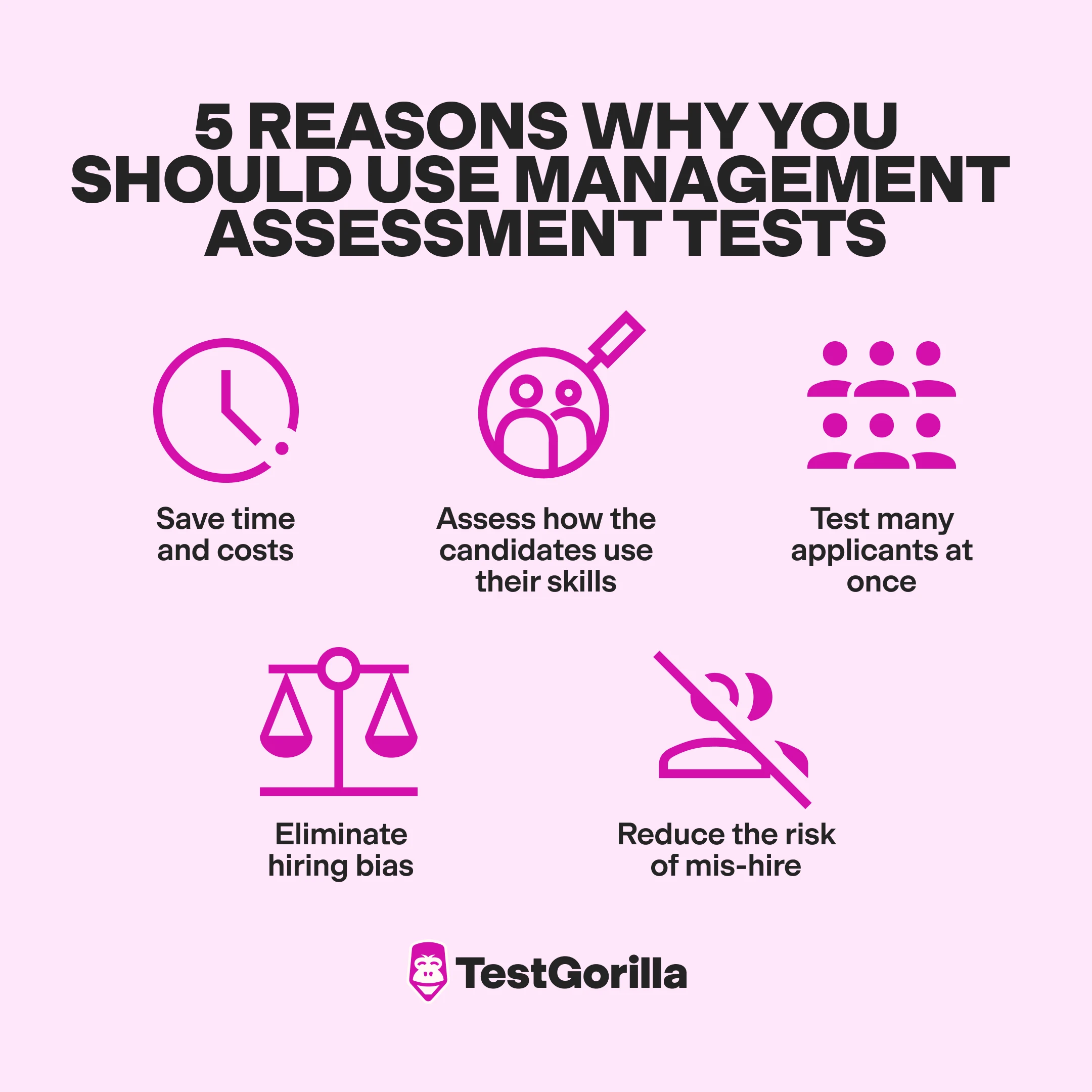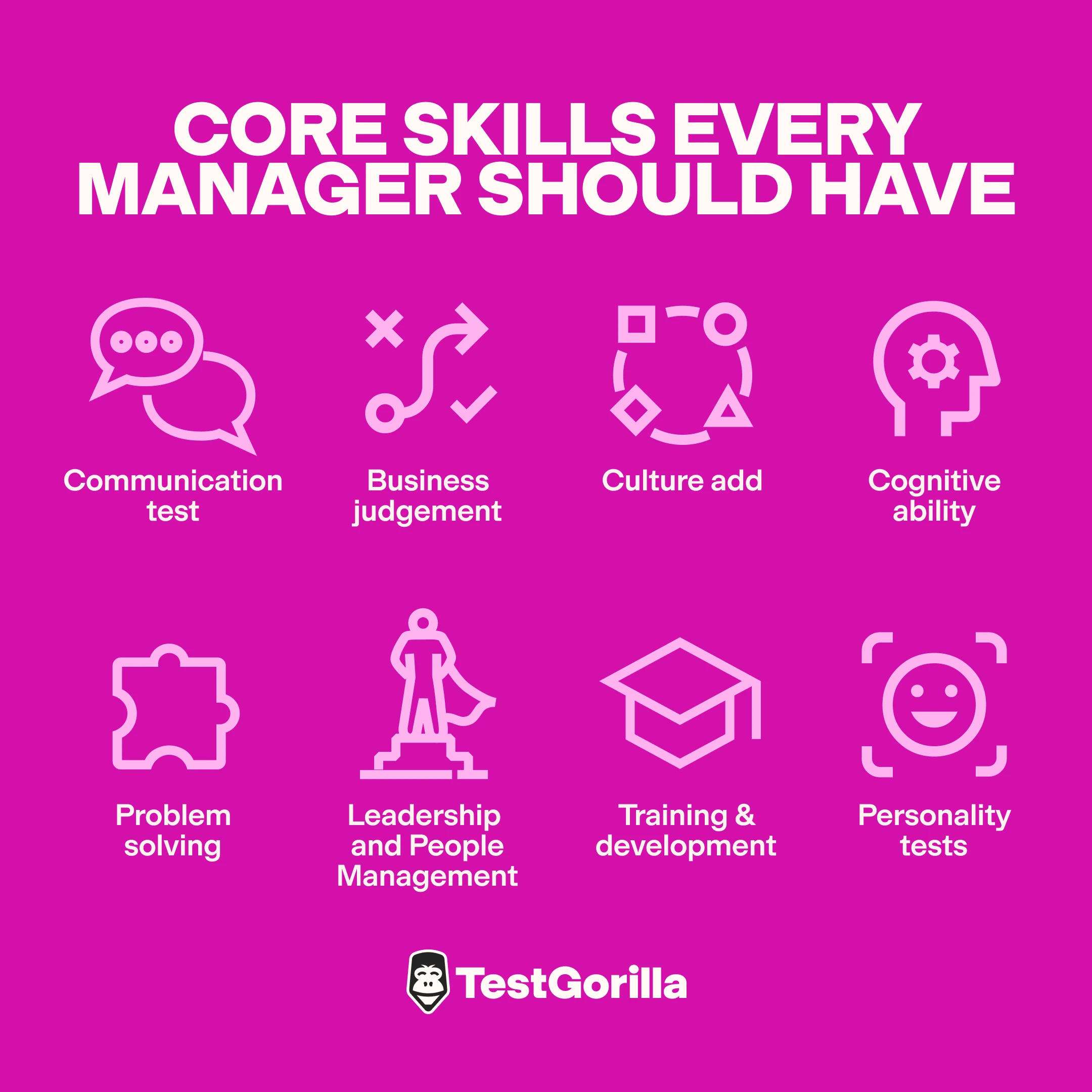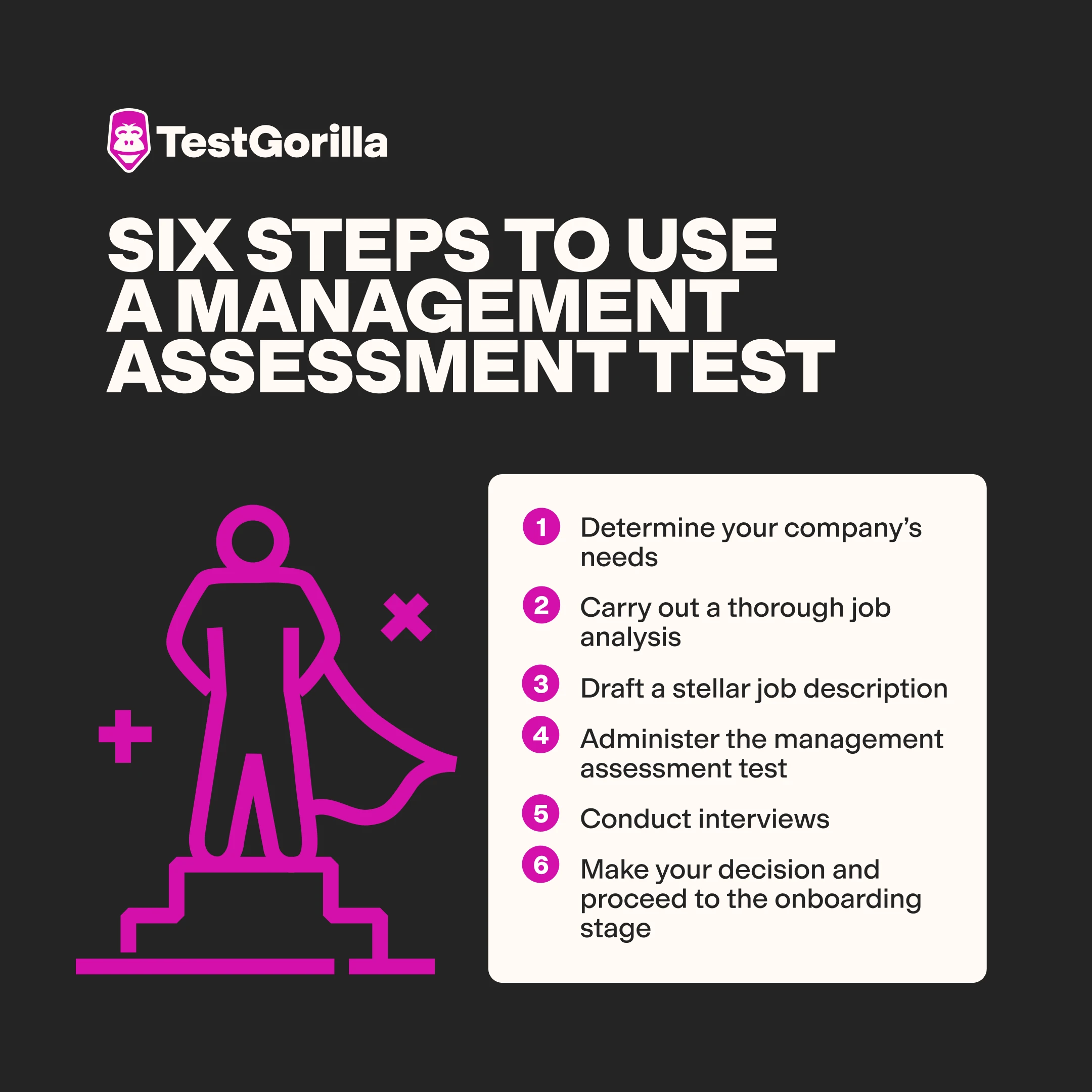Management assessment test: A recruiter’s guide to hiring better managers
Use our skills tests to find your next manager
When new managers fail to meet expectations, it can decrease team morale and productivity, lead to missed deadlines, and create a toxic work environment that pushes your best talent out the door.
That’s why it’s vital to objectively assess manager leadership and people management skills with a management assessment test.
In this article, we describe what a manager test is, the skills it measures, why you should use one in recruitment, and how to incorporate it into your hiring process.
What is a management assessment test?
A management assessment test evaluates a candidate’s suitability for a managerial position. This test assesses management skills like leadership, collaboration, and communication.
Great managers achieve 27% higher revenue per employee. This boost can significantly contribute to your company’s growth, so you should consider using a skills assessment management test to help you find the right talent.
Management assessments typically consist of multiple tests since managers need more than one skill to function effectively.
Why should you use management assessment tests?
According to research, 58% of employees who quit their jobs due to the toxic work culture stated they did it because of a bad manager. Using manager assessment tests helps you avoid management mis-hires who drive your employees away.
Management tests have several other benefits:
Save time and costs by automating the selection process and reducing the need for multiple lengthy interview rounds
Assess how the candidates use their management abilities in real-world scenarios rather than just theoretical knowledge
Let you screen many applicants at once under the same conditions
Eliminate hiring bias by focusing on objective criteria to remove subjective judgments
Reduce the risk of hiring the wrong candidate for the job by testing manager skills
Pilgrims’ Friend Society experienced these benefits firsthand when the company decided to try TestGorilla.
After struggling to find an objective way to test candidates’ skills for senior management roles, the organization changed the approach and used our talent discovery platform.
Our aptitude tests improved the speed and efficacy of the candidate screening process, which helped the hiring managers find skilled applicants who were highly motivated to perform well. As a result, the company improved the quality of new hires, who excelled in their new roles.
Hire better managers with TestGorilla
Our talent discovery platform enables you to combine five skills tests to better assess candidates’ ability to lead and inspire others. Sign up for free and create your first talent assessment.
What skills does a great manager test measure?
Good managers require a diverse set of skills to lead teams effectively. That’s why you must create a multi-measure assessment that evaluates candidates based on all the essential management skills.
Here are the eight most important managerial skills and tests:
1. Communication
In a survey of more than 15,000 managers, 77.7% reported communication as a critical competency for a good manager.
Effective communication enables collaboration and constructive feedback, which is vital for productivity and a good team atmosphere.
Without good communication skills, a manager can give vague instructions, confusing the team. When the project fails to meet objectives, it disrupts the workflow and causes low morale.
The best way to avoid hiring a manager with bad communication skills is to use our Communication (Intermediate) test.
This test evaluates candidates’ ability to convey information clearly, listen actively, and respond appropriately in various workplace scenarios.
To see more examples of questions from the Communication (Intermediate) test, check out the preview questions.
2. Business judgment
Business judgment is the ability to make informed decisions and take actions that benefit the company and contribute to its success. Managers with strong business judgment can analyze complex situations, weigh the potential risks and benefits, and choose the best course of action to ensure long-term growth and profitability.
To assess this critical skill, you can use our Business Judgment test. This test evaluates a candidate’s ability to make sound business decisions by presenting realistic scenarios requiring strategic thinking, problem-solving, and a deep understanding of business principles.
Here’s an example question to get an idea of what the test looks like:
3. Culture add
Culture add refers to hiring a manager who shares your organization’s values but contributes to diversity with new perspectives rather than simply fitting the existing mold.
Unlike culture fit, which focuses on how well a candidate aligns with the current company culture, culture add emphasizes the value of different perspectives, ideas, and approaches that can drive innovation and inclusivity.
You can use our Culture Add test to evaluate candidates’ potential to enrich your company culture by identifying their values, attitudes, and behaviors that support diversity and innovation.
4. Cognitive ability
Cognitive abilities enable managers to process complex information, make informed decisions, and adapt to new challenges. That includes memory, attention, situational judgment, and problem-solving.
Managers with strong mental skills can quickly assess situations, identify the best course of action, and guide their teams with confidence and clarity.
At TestGorilla, we offer a range of cognitive ability tests necessary for effective management, including:
Critical Thinking test
Attention to Detail test
Intermediate Math test
Numerical Reasoning test
5. Problem solving
Whether resolving conflicts, managing unexpected project issues, or making strategic decisions under pressure, strong problem-solving is essential for maintaining productivity and achieving organizational goals.
The easiest way to do that is to evaluate this skill is to include our Problem Solving test in your talent assessment.
This test presents candidates with scenarios that require logical reasoning, creativity, and strategic thinking to resolve. It evaluates applicants’ ability to analyze complex situations, identify potential solutions, and implement them effectively.
The best part is – you can use our Problem Solving test for free when you sign up for the Free forever plan.
6. Leadership and people management
Effective leadership and people management are key skills for maintaining a productive and positive work environment. Managers with strong leadership abilities can inspire teams, make strategic decisions, and engage employees.
On the other hand, poor leadership can lead to disengagement, low morale, and high turnover. In fact, 57% of people have quit a job at some point in their lives due to a poor boss.
To assess leadership potential, you can use our Leadership and People Management test. This leadership assessment evaluates candidates’ ability to manage teams, handle conflict, and lead by example, using questions like the one below:
7. Training and development
Managers proficient in training and development can identify areas where their team members need support, provide the necessary resources, and create an environment of continuous learning.
Considering that a lack of growth opportunities is the number one reason people consider leaving their jobs, it’s clear why these skills are so important.
You can use our Training and Development test to evaluate how good your candidates are at identifying training needs, creating development plans, and implementing programs to improve job performance.
8. Personality
Although skills and competencies are essential, a manager’s personality and emotional intelligence dictate how they tackle teamwork, handle stress, and make decisions.
A manager with the right personality builds trust, creates a positive work environment, and leads with empathy. In contrast, a manager with poor interpersonal abilities can create tension, reduce morale, and drive top talent away.
That’s why we’ve developed a range of culture and personality tests to help you assess whether your candidates fit your leadership needs. You can use our:
Big 5 (OCEAN) test
Culture Add test
16 Personality Types test
Enneagram test
Motivation test
Assess your candidates’ personality for free
When you sign up for the Free forever plan, you can use our Big 5 (OCEAN) and Motivation tests for free. Use them to assess your candidates’ personality and make smarter hiring decisions.
The best insights on HR and recruitment, delivered to your inbox.
Biweekly updates. No spam. Unsubscribe any time.
How to use a management assessment test: 6 steps
The right manager assessment test minimizes the risk of mis-hires and ensures your selected managers possess the leadership potential to drive your organization forward.
Below are the six steps to use management assessment tests effectively.
1. Determine your company’s needs
Determining your company’s needs enables you to lay down the requirements for the open position and provides a scale to rate each candidate.
You can analyze current manager performance to determine specific skill gaps in your management team. Ask key team members for the top qualities they need in the new manager.
After your investigation, you should be able to list the top three skills necessary for the role and the five most important responsibilities the new manager must excel at within the first six months.
2. Carry out a thorough job analysis
A job analysis helps you better understand the qualifications, skills, and level of experience a job requires, which enables you to create a job description that’s accurate and aligns with the needs of the role, helping you attract the right candidates from the start.
To perform a job analysis:
Examine existing job descriptions for similar roles to identify key responsibilities and required skills
Interview current managers in similar positions to gain insights into the daily tasks and challenges they face
Observe the role in its current capacity to understand the specific tasks and responsibilities involved
List the core competencies and behaviors that are essential for success in this role
Work with HR to ensure the job analysis aligns with company policies and future needs
Compare the role with similar positions in your industry to ensure your analysis is comprehensive
3. Draft a stellar job description
Your job description is the first thing candidates see and use to base their impressions about your company. A great job description helps attract more candidates. More importantly, it attracts those who are qualified and aligned with your company’s needs.
To reach high-quality candidates, you must post your job description on platforms that cater to professionals in your industry, like Indeed and Glassdoor.
Here’s how to write better job descriptions and reach the best candidates:
Step | Tip |
Create clear job titles | Reflect the role’s responsibilities and seniority level |
Outline the most important tasks | Focus on what the manager should achieve rather than just what they do |
Define required skills | Emphasize skills instead of experience |
Use clear language | Avoid unnecessary industry jargon |
Be transparent about compensation | Include a salary range and benefits package |
Explain your company’s culture | Create a brief section to attract candidates with the same values |
4. Administer the management assessment test
After posting the job description and accepting applications, the next step is to administer the management assessment to the candidates.
There are several effective ways to administer these assessments, including:
Manager test | Benefit |
Online tests | Enable candidates to complete them remotely. This approach is practical for validating skills like leadership, communication, and problem-solving. |
Scenario-based assessments | Evaluate the candidates’ problem-solving skills, decision-making abilities, and how they handle stress and conflict by presenting them with problems they can encounter on the job. |
Timed assessments | Assess how candidates perform under pressure, which is crucial for managerial roles because they require quick decision-making. |
Combination of tests | Use a mix of online employment tests to assess manager skills and competencies. For example, combining a leadership assessment with a technical skills test helps you understand a candidate’s suitability for a management position. |
Hire smarter with our skills tests
Use our skills tests to make faster, smarter, and more objective hiring decisions. Book a live demo to learn why 92% of employers think skills-based hiring is a better way to identify top talent than resumes.
5. Conduct interviews
Conducting interviews is a great way to learn more about applicants’ non-technical skills and personalities.
Using structured interviews is particularly effective because it ensures consistency and fairness. This approach helps you compare responses more objectively and avoid biases that can arise from unstructured, conversational interviews.
Here’s how to get the most out of your interviews:
Create a list of 10 questions directly related to the key competencies needed for the role
Ask candidates to describe solutions they would use to overcome work challenges to assess their problem-solving skills
Include at least one question about how the candidate prefers to work and interact with their team
Observe how clearly and concisely the candidate answers questions to evaluate their communication skills
Write down key points from each candidate’s responses to ensure accurate comparisons later
6. Make your decision and proceed to the onboarding stage
When you find the perfect candidate, you should always extend a job offer immediately to secure their spot in your organization. Afterward, you can proceed to onboarding and orientation to help them become familiar with your business.
The key is to emphasize the benefits and opportunities of the role to reinforce their decision. Clearly outline the new hire’s responsibilities and what success looks like during their first 90 days.
You should also have a detailed onboarding schedule that includes introductions to the team, company policies, and key projects. Ensure all tools, systems access, and materials are ready before the new manager’s first day.
Sharpen your recruitment process with TestGorilla with management assessment tests
Integrating manager assessment tests into your recruitment helps you make more informed decisions, reduce the risk of mis-hires, and build a stronger management team.
TestGorilla offers a range of skills, personality, cognitive ability, and culture tests designed to give you a complete understanding of your candidates’ potential. That way, you can easily validate technical expertise, leadership skills, and cultural add to hire the best managers for your team.
Get started with TestGorilla by creating a free account.
Visit our test library to explore our tests and begin hiring the best managers for your business.
Related posts
You've scrolled this far
Why not try TestGorilla for free, and see what happens when you put skills first.





























